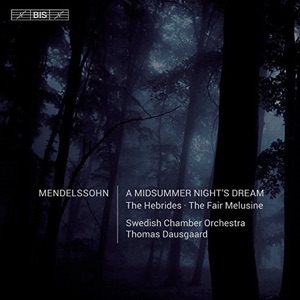As time goes on, the clearer it becomes that for Tomas Dausgaard music starts with Carl Nielsen. In very late romantic and twentieth-century repertoire, he can be amazingly persuasive. Earlier than that, though, and he seems to have adopted a version of the period performance orthodoxy that demands fast, stiff tempos and a “hands off” approach to phrasing that sounds as if there’s no guiding intelligence coming from the podium at all.
This is not to say that Dausgaard has no ideas. It’s just that he has very few, and uses the same ones too often. Hence, he attempts to compensate for the the mechanically rigid speeds by fiddling with dynamics, usually making unwanted crescendos just to prove that he can do something original. Well, it’s not original. It’s annoying. The overture to A Midsummer Night’s Dream lacks atmosphere, with the individual ideas insufficiently characterized. Where is the grandeur of the Wedding March? The romantic poetry of the Nocturne?
The same holds true for The Hebrides and The Fair Melusine. Admittedly the Swedish Chamber Orchestra plays splendidly, and the sonics are terrific, but Dausgaard brings nothing to the picnic beyond a certain robotic efficiency. Mendelssohn may not be the most romantically effusive of nineteenth-century composers, but here’s way more to him than Dausgaard lets us hear in these sterile, charmless readings.
































